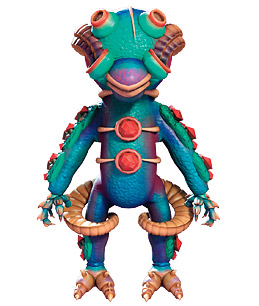
Players create their own aliens, which Spore automatically animates.
Will Wright is that rarest of creatures, a true intellectual omnivore. He is literally interested in everything. Based on his conversation, he might be a molecular biologist or an economist. In fact, he designs video games for a living. Wright is the inventor of The Sims, the revolutionary game in which actual humans control the lives of little simulated humans, making them go to work or fall in love or swim around in virtual swimming pools till they drown. The Sims is the best-selling computer game of all time. Among game designers, Wright is considered a living god. Now he wants to make you a god too.
For the past seven years, Wright has been working on one of the most ambitious video games ever conceived. The basic idea is to blow out The Sims to the horizon in all directions: this time you create and control an entire species. Wright's first title for the project was Sim Everything. Later he settled on Spore. It will be released on Sept. 9.
The opening act of Spore shows a comet crashing into Earth bearing organic material from outer space. This represents an actual hypothesis of how life on Earth began, called panspermia, which Wright considers to be fairly plausible. (He describes himself as "definitely an atheist. Well, agnostic atheist maybe.") But that's not why he put it in Spore. He put it in because it's more fun than other hypotheses. "We did a lot of prototypes around more of a biogenesis model," Wright says. "Autocatalytic sets, emergent chemistries. The programmer and I really enjoyed playing with those. Nobody else did. They were a bit abstract." One of the drawbacks of being interested in everything is having to remember that not everybody else is.
God rested after he created life, but you're just getting started. Next you shepherd your fledgling life-form through its single-celled stage until it's ready to crawl onto land, at which time you decide where its various eyes and ears and limbs and less easily identifiable appendages go. Then it must learn to feed itself and reproduce. Eventually, it forms tribes and builds cities. Finally it achieves spaceflight, whereupon you guide it off into the galaxy to meet other sentient species.
You can't turn the entire history of life into a video game without wrestling with some heavy philosophical questions, but Wright seems to have steered a middle course that avoids both religious and evolutionary blasphemy. You could read Spore equally easily as a model of evolution or of intelligent design, with you in the role of Intelligent Designer. (O.K., it's a bit blasphemous.) "A game like this can actually generate interesting, meaningful conversations between people," Wright says. "I think that's the best thing it can do."
They'll talk about it, but will people actually want to play Spore? In June, Wright released the game's creature-design module as a free download. He thought he might see a million designs by the end of the year. Instead, he got a million in the first week. "Eighteen days after we released it, we'd exceeded the number of known species on Earth," he says. "I thought that was a nice metric." Wright also discovered that he'd inadvertently created a new art form: Spore-nography. People were using Spore to create creatures that looked like, well, genitals. "We anticipated that," Wright says. "But I was really surprised at how good the Sporn was. Because we were doing these really pathetic-looking penises, you know? And they were doing these amazing, really explicit things that would animate correctly!"
In The Sims, people told stories about their private lives. Spore should lend itself to very different kinds of narratives. "I think Spore is going to be closer to Tolkien or Lucas or Kubrick," Wright says, "in terms of these very epic stories about the meaning of life and its destination." What's interesting about Wright is that he doesn't have to be Tolkien or Lucas or Kubrick. He wants you to be. "I'm a little different from a lot of other game designers in that I'm never interested in trying to tell a story," he explains. "I'm much more interested in the players being able to tell stories."
